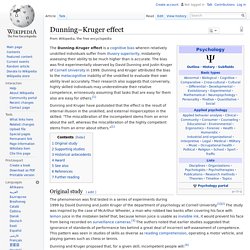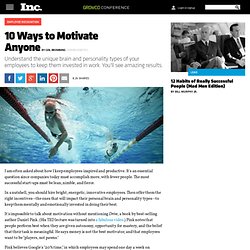

Dunning–Kruger effect. The Dunning–Kruger effect is a cognitive bias wherein relatively unskilled individuals suffer from illusory superiority, mistakenly assessing their ability to be much higher than is accurate.

The bias was first experimentally observed by David Dunning and Justin Kruger of Cornell University in 1999. Dunning and Kruger attributed the bias to the metacognitive inability of the unskilled to evaluate their own ability level accurately. Their research also suggests that conversely, highly skilled individuals may underestimate their relative competence, erroneously assuming that tasks that are easy for them also are easy for others.[1] Dunning and Kruger have postulated that the effect is the result of internal illusion in the unskilled, and external misperception in the skilled: "The miscalibration of the incompetent stems from an error about the self, whereas the miscalibration of the highly competent stems from an error about others. Original study[edit] Supporting studies[edit] Award[edit] 10 Ways to Motivate Anyone.
I am often asked about how I keep employees inspired and productive.

It's an essential question since companies today must accomplish more, with fewer people. The most successful start-ups must be lean, nimble, and fierce. In a nutshell, you should hire bright, energetic, innovative employees. Then offer them the right incentives--the ones that will impact their personal brain and personality types--to keep them mentally and emotionally invested in doing their best. It's impossible to talk about motivation without mentioning Drive, a book by best-selling author Daniel Pink.
Pink believes Google's "20% time," in which employees may spend one day a week on whatever they want is a shining example of how allowing intrinsically-based motivations (a sense of accomplishment or purpose) can flourish. There's no question that intrinsic motivation is essential. That said, there is no cookie-cutter approach to motivating your people. 1. Moral Foundations. Lucid. How To Tell If Someone Is Lying - Eye Patterns of a liar. Have you ever been accused of lying just because you refused to make eye contact with someone? Well it's not if you're looking, but it's where you're looking that gives you away.
Every time you look in a direction, there is a reason, it's not just a coincidence. Your subconscious mind is responsible for this. Before determining if someone is lying by just their eye patterns, be sure you get to know their natural movements. Manipulation News, Videos, Reviews and Gossip - Lifehacker. Techniques for Changing Minds.
How to Read Body Language to Reveal the Underlying Truth in Almost Any Situation. Science & Nature - Human Body and Mind - Mind. 10 Life-Enhancing Things You Can Do in Ten Minutes or Less. It usually takes us much longer to change our moods than we’d like it to take.

Here are ten things you can do in ten minutes or less that will have a positive emotional effect on you and those you love. . See it online at Oprah.com . This is a deeply moving segment that may be the best ten minutes you've ever invested in front of a computer. . . . The experience will fill you with fond memories and perhaps make you a bit wistful for days gone by. . . Then spend that time just holding each other.
Studies show that hospital patients who can see a natural body of water from their beds get better at a 30 percent faster rate. Shake, twist, and jump around. Sadly, many people measure happiness by how long the experience lasts. Technology Laws.